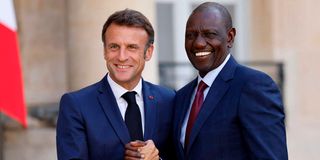Do not allow US politics to continue blocking funding

French President Emmanuel Macron (left) shakes hands with Kenyan President William Ruto as he leaves after their meeting at the Elysee Palace, amid the New Global Financial Pact Summit in Paris on June 23, 2023.
Barbados Prime Minister Mia Mottley and French President Emmanuel Macron invited world leaders to Paris on June 22-23 for a new “global pact” to finance the fight against poverty and human-induced climate change. Yet few dollars were put on the table.
To a significant extent, the continuing global failure to finance the fight against poverty and climate change reflects the failings of US politics, since the US, at least for now, remains at the centre of the global financial system.
To understand US politics, let’s start with the history of the British Empire. As Britain became an imperial power, and the world’s leading power of the 19th century, British philosophy changed to justify the empire.
Its philosophers championed a powerful state (Thomas Hobbes’s Leviathan), protection of wealth over redistribution (John Locke’s right to “life, liberty and property”), markets over government (Adam Smith’s “Invisible Hand”) and the futility of aiding the poor (Malthus’s law of population).
During famines, Britain rejected providing food aid and left millions of its subjects to starve, even though supplies were available to save them.
Poverty
The inaction was in line with a laissez-faire philosophy that viewed poverty as inevitable and help for the poor as morally unnecessary and practically futile. The elites only wanted low taxes and a powerful navy to defend their overseas investments and profits.
The US learnt its statecraft at the knee of Britain, the mother country of the American colonies. Its founding fathers molded the country’s political institutions and foreign policies on British principles. The lead author of the US Constitution, James Madison, was an ardent enthusiast of Locke’s. Born into slave-owning wealth, he was interested in protecting wealth from the masses.
His strategy worked: The US federal government is largely insulated from public opinion. The public majority opposes wars, supports affordable healthcare for all and champions higher taxes on the rich. The Congress routinely delivers wars, over-priced private healthcare and tax cuts for the rich.
The leaders at the Paris Summit recognised the urgent need for a massive expansion of official development financing from the multilateral development banks (MDBs)—the World Bank, African Development Bank, Asian Development Bank and others.
Major economies.
Yet to expand their lending as needed, the MDBs will require more paid-in capital from the US, Europe and other major economies. Yet Congress opposes investing more capital in the MDBs and the US opposition is (so far) blocking global action.
Developing countries need hundreds of billions of dollars in additional MDB lending yearly but the US and Europe want the MDBs to lend slightly more. In Paris, the developing world was exasperated. Brazil’s President Lula da Silva and some African presidents lamented too many summits and too few dollars.
Let the rest of the world move forward with or without the US. Even the US plutocrats will realise that it’s better to pay the modest price of fighting poverty and climate change than to face a world that rejects their greed and belligerency.
Prof Sachs is professor and director of the Center for Sustainable Development at Columbia University and president of the UN Sustainable Development Solutions Network. www.jeffsachs.org.





